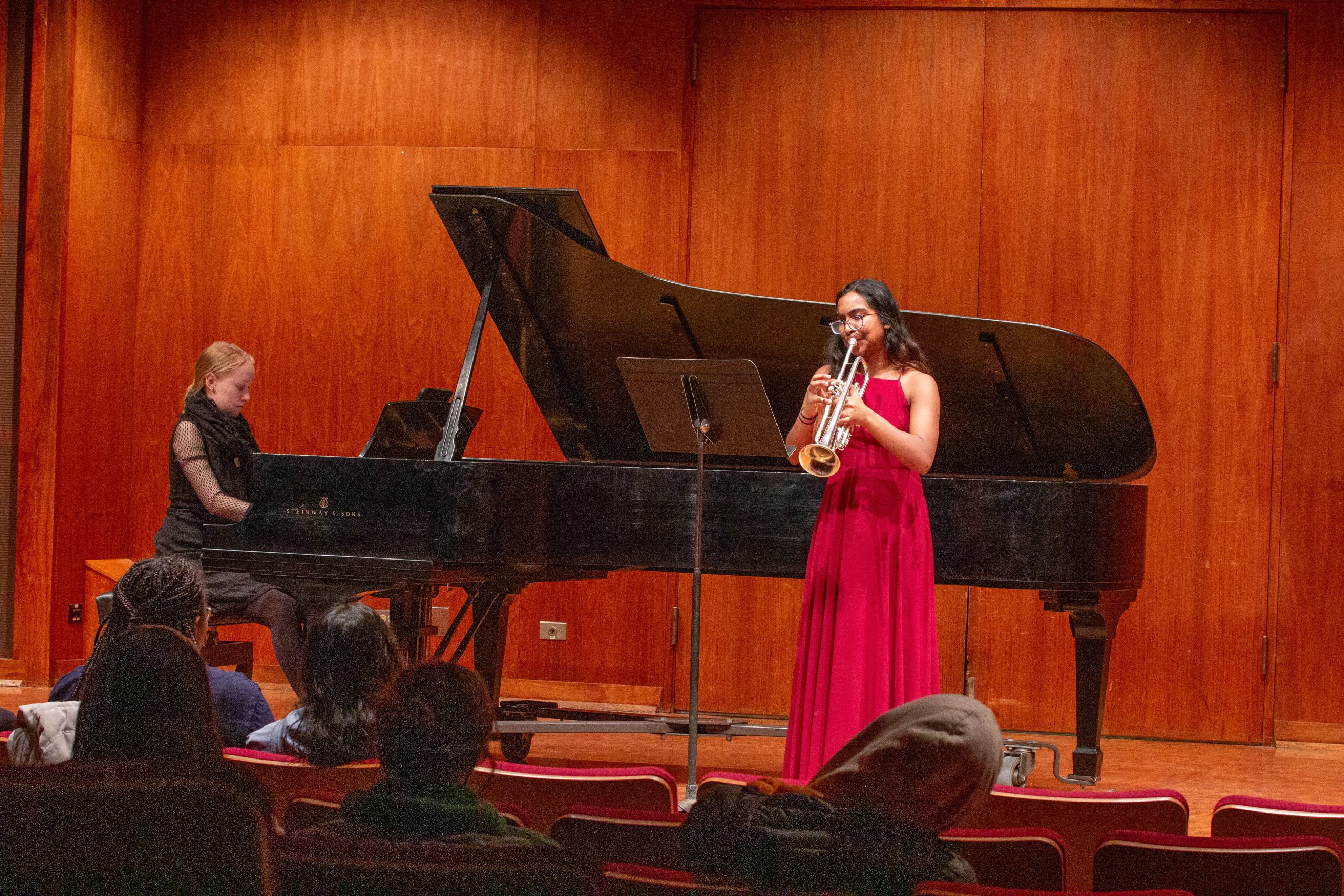This past weekend included senior recitals from three conservatory students: John Stecher (saxophone), Matthew DeChant (composition) and Sudha Schultz (both trumpet and voice).
Stecher’s program consisted exclusively of works by living and recent composers, beginning with “Blue Caprice” by Victor Morosco. Though initially fast-paced, the work was divided into different affects, including lyrical, swinging and etude-like sections. The immediate transition between such divisions was occasionally abrupt, but that may have simply been the nature of the piece.
What followed was “Escapades,” a John Williams composition from the 2002 film “Catch Me If You Can.” Stecher was joined by the pianist Susan Wenckus; they began the piece with simultaneous snapping between phrases. Given that the movie concerns a con artist, the work seemed appropriately sly and mysterious.
For the finale, Stecher was joined by junior Jackson Peters (guitar), junior Jando Valdez (bass) and senior David Pickar (drums) to perform Frank Foster’s “Shiny Stockings.” Though a laid-back tune, the musicians delivered a full-energy interpretation, offering a satisfying end to the recital.

Without knowing beforehand, it may not have been obvious that Matthew DeChant’s recital was for music composition. He boldly included a huge influx of theatrical elements, entering in a ringmaster costume to announce the title of his performance, “The Other Half of [Kurt] Weil.” DeChant explained, “This is a celebration of music, but it is first and foremost a theater show, for is all music not theater?”
DeChant’s first composition was “The Idler,” sung by junior Lily Nittler with junior Logan Griggs on the piano. Set to text by Alice Dunbar Nelson, it was a gentle and touching art song. A set of piano pieces followed, “3 Meditations on ‘Rosencrantz and Guildenstern are Dead,’” performed by Griggs alone. It was a set of wide variety, with fitting programmatic affects: the conversational first movement “Language,” the narratively exciting “Storytelling” and the somber final “Death” movement.
For the next piece, “Antonine,” with junior Sam Johnson on trombone, DeChant included a background track with everyday sounds like ringing phones and traffic noises. The most memorable portion of the recital involved his fixed media composition “Biomass.” During its introduction, Alec Welhouse—also adorned in full cabaret attire—encouraged audience members to walk on stage and essentially do anything.
The result was as bewildering as it was interesting. Two audience members began moving chairs, stands and microphones, and then played familiar tunes on the piano. They were reacting, albeit subtly, to DeChant’s fixed media composition. Some audience members murmured in displeasement or disbelief at the act. Their disapproval seems unwarranted; if art cannot be allowed to breathe, then why allow it at all?
Two quartets finished the program. First, a string quartet played “Rosario,” with junior Brock Royle (violin), senior Joel Peterson (violin), junior Mallory Welsch (viola) and sophomore Arthur Johnson (cello), while DeChant himself sang a sea shanty-like tune. This was followed with “The Steward,” written in memory of Christopher Tolkien, performed by a horn quartet consisting of Alan Schlessinger, Rebecca Baron, Lauren Coon and Connor Parr.

As both a trumpeter and soprano vocalist, the recital of Sudha Schultz was jam-packed with a vast variety of music. She opened on trumpet, with Marisa Landsverk at the piano, playing “Concertpiece No. 2” by the Russian composer Vassily Brandt. The composition itself felt disjointed, but Schultz’s playing effectively brought out the virtuosity within.
Throughout the program, Schultz rotated between singing, trumpet, flugelhorn and at one point even baroque trumpet. Impressively, at no point did any of these mediums seem subpar. A particularly high point was Schultz’s performance of “On the Steps of the Palace” from Stephen Sondheim’s “Into the Woods,” during which she committed fully to a colorful and engaging characterization and performance.
For a few pieces, Schultz presented the works in usual circumstances. During two movements from Alessandro Scarlatti’s “7 Arie con Tromba,” she and Brianna McCarthy each alternated between baroque trumpet and voice. Then, for the famous “Flower Duet” from “Lakmé” by Léo Delibes, Schultz sang the soprano part while being joined by Landsverk on piano and both McCarthy and Theresa Gruber-Miller on trumpet.
All in all, Schultz’s recital offered an appreciated breadth of diverse repertoire. Indeed, to be able to attend three senior recitals of such drastically different scopes in one weekend is a most welcome opportunity.

